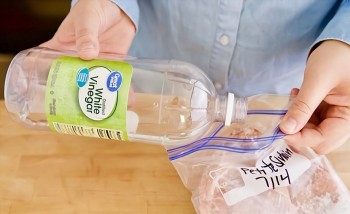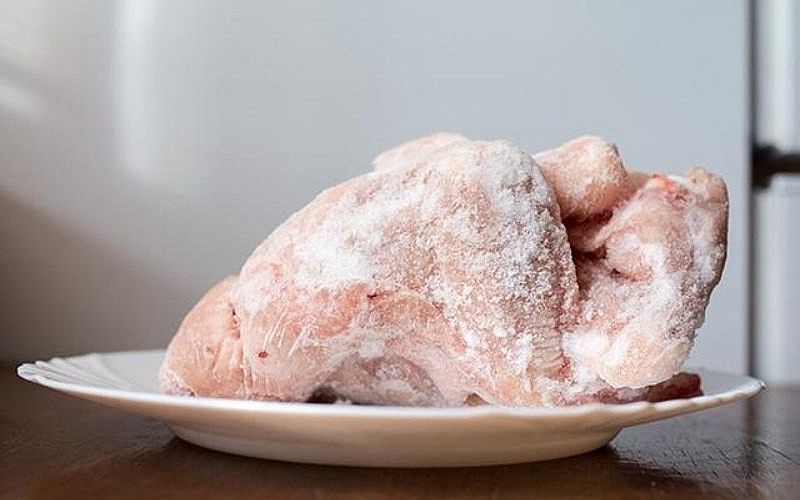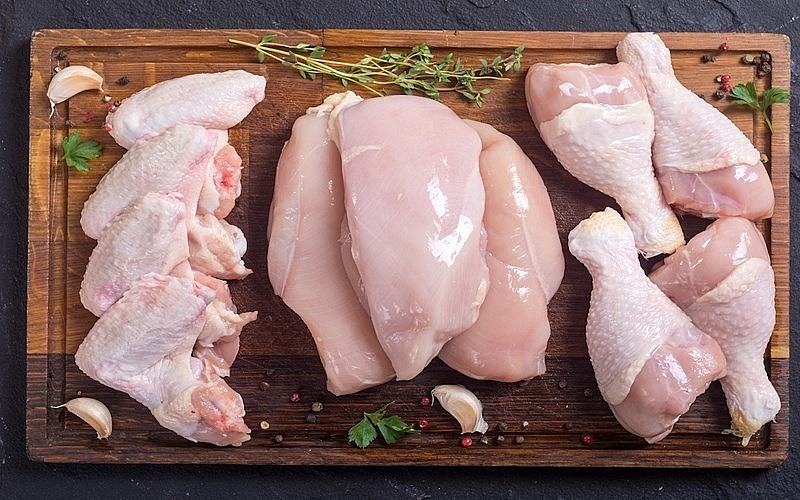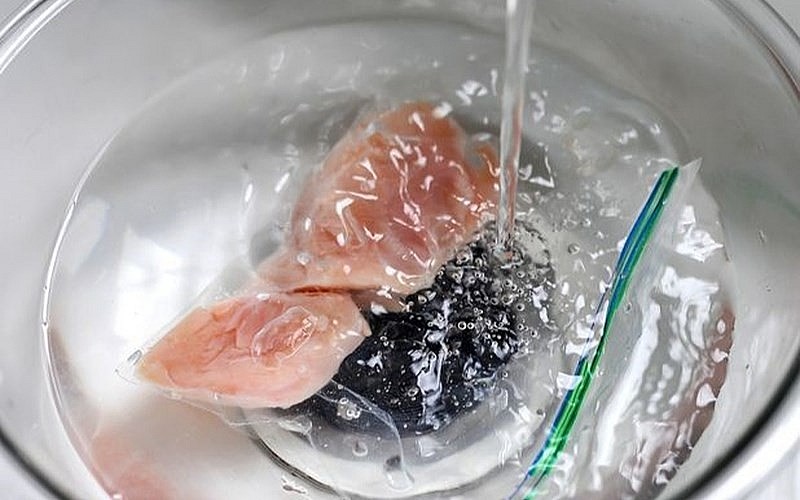Tips to Quickly Defrost Chicken With Salt, Sugar, Lemon - Without A Microwave
 How To Defrost Meat By Vinegar And Salt Water Without Microwave How To Defrost Meat By Vinegar And Salt Water Without Microwave |
 Tips to Defrost Fish in 5 Minutes Without Soaking in Hot Water Tips to Defrost Fish in 5 Minutes Without Soaking in Hot Water |
 |
| How to Defrost Chicken With Salt, Sugar, Lemon, Vinegar |
| Contents |
Chicken is a simple ingredient that can be used to create a variety of delicious and diverse dishes for family meals. Today, KnowInsiders will reveal kitchen tips for quickly and properly freezing chicken for flavorful and nutritious chicken dishes!
Ingredient
• 1 chicken (1.4 - 1.5kg)
• Salt, sugar, lemon, water
• Brass, pot or high-sided pot
1. Why is it necessary to defrost chicken?
Are you a person who prefers fresh, hot meals over pre-prepared meals? Are you someone who prefers quiet gatherings around a family meal to noisy and bustling restaurants? Or are you just a fan of delectable and nutritious game chicken?
All of these factors will make it impossible for you to avoid encountering frozen chicken pieces, and you will need to know how to defrost chicken at home!
Furthermore, for health reasons, properly defrosting chicken is more important than ever:
• Cooking chicken before defrosting can easily result in a situation where the outside is cooked but the inside is still raw, allowing bacteria to remain and compromising food safety.
• Chicken is not included in the food groups that can be used directly in Japanese dishes.
• Campylobacter is a bacteria that is commonly found in meat, particularly frozen chicken. When this bacteria infiltrates the body, it causes high fever, diarrhea, and severe stomach cramps.
• Salmonella is a potentially lethal bacteria. If you use unthawed chicken, you run the risk of being infected with this bacteria, which will cause severe diarrhea.
• Clostridium perfringens is a fungus that grows in frozen meat and prolongs diarrhea.
• As can be seen, defrosting chicken before processing is critical to ensuring health and creating a fresh, delicious, and nutritious dish.
How to Quickly Defrost Chicken with Water, Sugar, Lemon (or Vinegar) and Salt
 |
| How to Quickly Defrost Chicken Without Microwave |
Follow the steps below to defrost chicken quickly and prevent it from losing quality.
To begin, gather the following ingredients: water (not hot water), salt, sugar, lemon or vinegar.
These are ingredients that you should have on hand. They will help defrost meat more quickly while maintaining freshness and preventing bacteria from entering.
Remove the packaging, bags, food wrap, etc. from the chicken before defrosting.
Fill a pot halfway with water to completely cover the chicken. Stir in a pinch of salt, sugar, and a squeeze of lemon until dissolved. To create a scent, place the lemon peel in the water basin.
Using physical and chemical properties such as salt separation, sugar preservation, salt isotonicity, and acid that breaks down muscle mass, meat softens quickly. Using sugar, salt, and lemon/vinegar will help you defrost meat faster.
Salt aids in the breakdown of enzymes, the damage of bacterial DNA, and the prevention of bacterial growth. Furthermore, salt has neutral properties. When the salt concentration in the brine is high (hypertonic brine), the salt will move into a less saline environment (hypotonic brine) to create isotonicity.
Meanwhile, sugar has water-retaining properties, which aid in the retention of the natural water within the chicken, preventing it from losing quality during the soaking process.
Many European and American chefs now use brine liquid to prepare chicken breasts. That is, the chicken breast will be soaked in salt water mixed with sugar before being processed to help make the meat more tender and succulent.
Lemon and vinegar are both acidic. The acid will dissolve the connecting fibers, allowing the meat to become tender quickly.
As a result, using salt water, sugar, and lemon is one method to help meat defrost quickly while retaining its fresh flavor. This method is applicable not only to chicken but also to pork, fish, and other meats.
Soak the chicken in the prepared lemon sugar brine for 30 minutes. Make sure there is enough water to cover the chicken. Soak the chicken for about 30 minutes in it. The chicken will gradually separate into blocks, soften, and no longer have stones in its stomach. The skin of the chicken retains its lovely yellow color, and the meat is as soft and fresh as new.
Once the chicken is soft, you can wash it and cook it to your liking.
| Note: • Defrosted chicken should be processed immediately, avoid refreezing. • Do not soak meat in water for longer than 2 hours to avoid bacteria from growing and degrading the meat. |
Submerge Frozen Chicken in Water to Defrost
Defrosting chicken pieces that are medium in size or that have been deboned before freezing will be a little easier. In this case, defrosting can be accomplished by soaking in a basin of cold water.
Soaking chicken in water can help it defrost quickly, but the meat must be carefully wrapped to ensure watertightness while soaking. When soaking the chicken, use a zip bag or vacuum bag to keep it from getting wet.
Do not soak frozen foods in boiling or hot water; this is a common mistake that many people make. This will cause heat shock to the food and create an environment conducive to bacteria destroying the nutrition of the meat.
The time required for defrosting will be significantly reduced using this method. It will take 1 to 2 hours if the meat is small or pureed. If the meat is large or contains bones, soak it for several hours to completely defrost. To reduce the penetration of harmful bacteria, you must change the water on a regular basis and pay close attention to the food that has just been thawed and processed.
 |
| Defrost chicken by submerging it in water |
Slowly Defrost the Chicken.
Thawing larger pieces of meat or whole animals in the refrigerator compartment is always recommended. The defrosting time in the refrigerator for boneless chicken breast or pureed chicken will vary throughout the day.
With the cooler's temperature, you can only keep fresh food for 2 to 3 days. As a result, once defrosted, you must use it quickly to make the chicken delicious and nutritious.
Although defrosting chicken in the refrigerator is a common method, it does not solve the immediate problem of being hungry while the food is still frozen.
This method is for people who want to make chicken dishes ahead of time and have a lot of chicken to defrost. Although this method takes time, it is quite safe when compared to other methods.
Things You Shouldn't Do When Defrosting Chicken
You can protect your health by defrosting chicken before cooking. However, when defrosting chicken, we make numerous mistakes, increasing the risk of bacteria and fungi from the environment entering the body.
The first thing you should consider is the defrosting location. You must store the meat in a clean, dry environment that is free of contaminants. When defrosting meat near an area with a foul, strange, or stuffy odor and is not well-ventilated, bacteria in the environment become dense and ready to penetrate the food as soon as the ice is completely melted.
Another issue that many people have is wanting to cut the defrosting time as short as possible.
Food preservation in the freezer does not prevent the invasion of bacteria, but rather limits their activity. Meat will slowly decompose at low temperatures or, if bacteria are present, will go dormant without affecting the nutritional quality of the food.
As a result, quickly and properly defrosting chicken does not imply using much hotter temperatures or leaving it in direct sunlight.
| Note • To prevent air from entering the freezer, chicken should be tightly wrapped. A vacuum environment is the most ideal for preserving food. • Although freezing food can extend its shelf life, it is difficult to ensure the body's valuable nutrients such as lipids, cholesterol, vitamins, iron, magnesium, calcium... |























